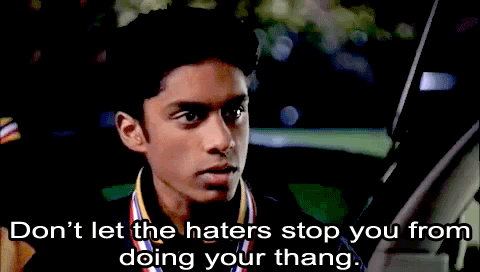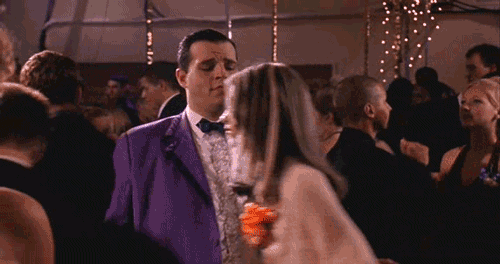If you follow many authors on Twitter or Facebook, read their blogs, attend their events, or read the Acknowledgements pages in their books, you’ve probably noticed what I have. Authors tend to hang out with other authors. They critique each others’ work. They go on retreats together. They cheerlead and support each other, and attend one another’s events. They have inside jokes and speak in code.
For a while, to me, it seemed a little like an exclusive club. Sure, I met some authors at various events, but without the secret password, I would never be permitted to cross the velvet rope and transition from “fan” into “friend.” I was an aspiring author, but they were authors. I could no sooner propose we meet for coffee than I could call up Jennifer Lawrence and invite her to my birthday party. (Sidebar: Jennifer, if you want to come to my birthday party, you are totally welcome to do that.)
They were the cool kids, and I was the friendless nerdling, longing to cross into their ranks but knowing, not-so-deep in my gut, that I was unworthy.
Then something interesting happened. I started seeing the same authors over and over at different events. Because here’s the thing about writers: they are readers. They love books just as much as you and I do. And that awesome book event I was so excited about? They were just as excited. Maybe even more so, because the featured authors were their friends.
After rubbing elbows with people a few times, eventually you have to stop gushing about only their books. Seriously, no matter how awesome the book is, it can only sustain a conversation for so long. So without quite realizing it, I found myself discussing other topics with these authors I so admired. Our kids, and if all of them are so weird, or just mine. Doctor Who, and whether or not it is permissible to skip the Ninth Doctor (in my opinion, no). Harry Potter, whether Snape redeemed himself by the end, and which death was the worst. The love triangle in The Hunger Games, and whether or not it even exists.
Movies. Pets. Books. Chocolate. The kind of topics you talk about with normal people.
Here is the secret: writers are people. And not in a creepy, Soylent Green sense. They are readers and critics and fans and dreamers and doubters. Just like the rest of us. And as with any group of people, there will be some that are just your people. It won’t be everyone, but trust me. They’re out there.

When I found my people (and for me, it was kind of a magical all-at-once experience, a combination of putting myself out there and Twitter and joining SCBWI and divine providence), it opened up doors in my writing journey I didn’t realize were possible. This new community — that I never learned the secret password to, by the way — has enriched my life and my writing more than I can explain.
The beauty of having writer friends is that we are all creators and thinkers and analyzers. Writers understand the relentless gnaw of a new story idea, the satisfaction of seeing an empty page fill with words, the strange gleeful terror that comes with deleting a huge section of your book because you figured out a better way to do it. Writers understand the voices of doubt in your head that whisper “this sucks and no one will ever want to read it.” They don’t think you’re crazy when you’ve carefully plotted out a story, and then your characters insist on taking it in a totally different direction. They are excellent at hearing a broad synopsis for your broken story, hearing where you’re stuck, and coming up with absolutely brilliant ways to fix your problem. They are adept at talking you off the ledge when the query rejections start rolling in, one after the other, and then again when an agent does want to see your story, but then doesn’t get back to you in less than 24 hours salivating over your manuscript like that-magical-How-I-Got-My-Agent-blogpost-I-read-last-week (there is nothing like a freakishly rapid How I Got My Agent success story to make you come down with a debilitating case of Iprobablysuckandtheyhatemeitis).
So I guess I have a few points here.
1) The writing community can seem daunting to break into. I thought it was utterly intimidating. Until it wasn’t. A big part of that was realizing that other writers are like me. We share passions and interests and fears. The relationships don’t have to be forced. If you are a writer (and if you understood the entire above paragraph about writer brain, you are a writer), it will come naturally. And when it does, it is a beautiful, amazing, soul-enriching thing.
2) Writers are writers are writers. If you’d have told me a year ago that some of my favorite names from the book spines on my shelf would become the top contacts in my phone, I wouldn’t have believed you. But if you live in a city that’s not crawling with published authors, that’s okay too. Some of my best friends in the writing community aren’t published yet. Some aren’t even agented, or don’t have a completed manuscript. And that’s okay. The important thing is we’re all writers, our brains work similarly, and we are there to support each other, no matter how fledgling or established our writing careers
3) Joining a community requires putting yourself out there. And trust me, I know this can be hard. I am shy and introverted and awkward (which are not synonymous, by the way), and at first, going to events where I didn’t know anyone had me sweating like an Eskimo in the Sahara. But something I’ve learned is that the reading and writing community is built on shy, awkward introverts. I’ve found I work best when I interact with people online first (generally via Twitter), then meet them in person. Joining SCBWI and getting involved with my local chapter was also huge for me (RWA is another fabulous organization). But it’s different for everyone. (And if you live in the middle of nowhere with no other writers – BEHOLD the beauty of the Internet! Online friends are just as real as local friends.) The only universal truth here is that you won’t join a community if you never, ever reach out to other humans.
4) Writers make you a better writer. I don’t have a single writer friend whose writing has not benefited from friendships with other writers. Books are often group efforts. That’s why acknowledgement pages read the way they do. It’s not a club, and it’s not a Who’s Who. It’s like-minded people collaborating on stories, because that is what they love to do. Personally, one of the biggest things I’m looking forward to if (“when,” my writer friends would correct me, “always when”) my book ever becomes A Real Book is writing my acknowledgements. Not to name drop, but to publicly thank those people who have helped me grow so much from where I used to be, both as a writer and as a person. (Also, the other funny thing about all those Big Names in acknowledgement pages? They weren’t Big Names when they started. They were friends and critique partners all starting out together as newbie writers. Everyone has to start somewhere.)
5) A writing community and a critique group are not necessarily the same thing. I have a lot more writing friends than I do critiquers. Just because you know other writers or are friends with writers does not mean you have to always critique each other’s work. You may have totally differing tastes or writing styles, or you may write for different audiences. Or they may already have their own established critique groups and partners, and no time to work your writing into their schedule. Even if someone isn’t a great match for you as a critiquer, that doesn’t mean they can’t be a great friend and part of your writing support system.
6) You can be a writer even if you haven’t written anything yet. I think some of us unpublished, uncontracted, unagented, unfinished writers can tell ourselves that we are not “real” writers. We can’t attempt to join the club yet, because our credentials aren’t good enough. And that’s simply not true. The more time I spend with writers, the more I believe that being a writer isn’t about how many books you’ve sold or words you’ve written, but about about how you think, who you are, and what you aspire to. If you have stories in your heart and characters in your head and passion in your soul, but only a couple chapters actually written? No problem. You’re still a writer.
Anyway. This has gotten kind of long and rambly. I’ve just been thinking a lot lately about the writing community and how the people I’ve met have, quite literally, changed my life. And I’ve said on more than one occasion that if I had to choose between the people I’ve met and ever seeing my books on shelves, I’d choose the people, hands down. Obviously, I hope to have both, someday. But in the meantime, I will simply enjoy how very blessed I am to have such amazing friends (you know who you are) who get me, understand the weird way my brain works, and encourage me as I plunge ever further down the rabbit hole of storytelling.
(And if you’re not a writer, never fear. I’ve got reviews coming up. Just as soon as I can wrap my brain around the books I’ve read recently. Them’s thinkin’ books.)









Any suggestions for finding that writing community? I’m looking, but it seems to be a little harder for someone who writes non-fiction.
Elizabeth recently posted..An Essay I Didn’t Want to Write
Well I don’t write non-fiction, but I have a few suggestions.
1) Your local library. Ask if there’s any local writer’s groups that meet that welcome non-fiction writers, or if your librarian has any contacts.
2) Local book events for books that interest you, both fiction and non-fiction. Writers (at least here) make up a big portion of the audience for book events, and most audience members tend to be local. Just because it’s a fiction event doesn’t mean all the writers in the audience only write fiction.
3) Twitter. Some of my best writing friends I met over Twitter. We tend to follow the same people and engage in the same conversations. It’s amazing how much of someone’s personality can be broadcast over 140 characters. People you meet on Twitter probably won’t live locally, but I am not the only writer I know who has a good portion of their support system living hundreds of miles away.
4) Online forums like Absolute Write. There’s a nonfiction forum (which is what I’ve linked to) where I’m sure you can make some connections.
Hope that helps, and good luck!
I adore this post! I read it and laughed and nodded. Been there – done all that and would up where you did… I love meet ups with authors and I love that we can talk about our kids, our dogs, that great book we are reading now….
Sheila (Book Journey) recently posted..Blogiversary! Year 4 – and Gifts Galore!!!
Just wanted to pop my head in and tell you that I love to read your writing. I adore your style. It makes me smile and laugh and frankly – *you’re* one of those cool kids I want to rub elbows with. When I’m done being a hermit.
Mandi Kaye recently posted..On Where I’ve Been.
*tackle hugs you*
Be a hermit as long as you need. Sometimes hermitude is necessary.
TheHouseworkCanWait recently posted..Sitting at the Cool Kids Table, and other musings on the writing community